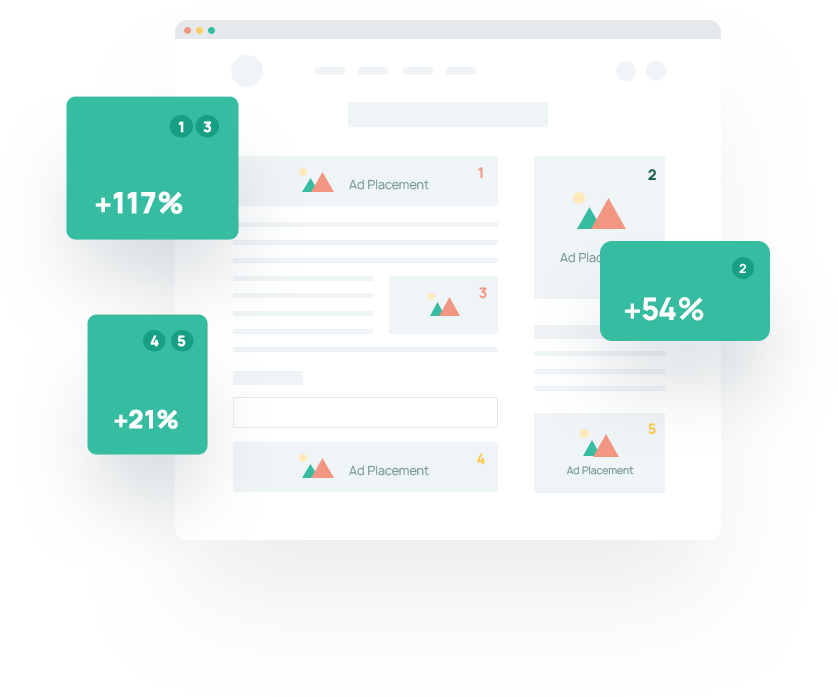Search Engine Optimization (SEO) has metrics that can significantly impact your business. You should track these metrics to get the most from your web marketing efforts, increase your ranking factor on search engines, and improve the user experience.
These metrics are also known as SEO Key Performance Indicators (SEO KPIs). SEO KPIs tell you how your website performs in areas that improve your web traffic and enhance your marketing efforts, giving your website better performance in Search Engine Results Page (SERP) rankings.
What Is SEO?
Search Engine Optimization (SEO) encompasses everything you do to get your website ranking higher among organic search engine results. When you rank higher, you get more organic clicks through to your website and more overall organic traffic. From a marketing perspective, this means more potential conversions and higher sales.
A good SEO strategy includes three essential steps for achieving SEO success.
- Research the keywords your target customers use for your products or services.
- Create content targeting keywords that meet potential customers’ needs by answering their questions while optimizing your content for the highest ranking on SERPs.
- Monitor your site’s SEO performance through SEO KPI reports.
SEO efforts can be as cheap or expensive as your strategy allows, depending on what you want to track, how you develop content, and how you establish your website’s authority. Whatever you spend on SEO, there tends to be high profitability potential when you pay attention to the KPIs that will get your website the highest ranking possible.
By using SEO effectively, your product and service website ads will see more conversions, resulting in higher revenue.
Importance of Tracking KPIs
SEO KPIs tell you how your website might perform on SERPs because they include performance metrics that are likely to improve your search rankings. Product and service sales require good search visibility in today’s world because many potential customers spend their dollars online.
To make the most of your marketing strategy, you must pay attention to SEO metrics through SEO KPI reports. These reports will tell you how your website performs on the key performance indicators that will get you found online so people can buy what you are selling.
What KPIs To Use For SEO
When it comes to important SEO KPIs, there are many you can monitor and strategize around to improve your website’s SEO performance. Let’s discuss some of the most common SEO KPIs so you can determine what to track for your website.
The most common SEO KPIs that affect your content marketing ad performance are traffic, demographics, time on page, and impressions. Traffic refers to the number of visits your website receives from users.
Website demographics tell you about who is visiting your website, including things like age, gender, and purchasing preferences. You can view demographic information for visitors to any webpage on your site using Google Analytics.
You also want to pay attention to “time on page,” which means exactly what it says – how much time each visitor spends on your site. You can calculate time on page by determining the average time users spend on each webpage of your site or the average session duration for all website traffic.
Another KPI affecting ad performance is impressions. Impressions are the number of page views each piece of site content receives. If you want an ad to perform, users need to see it. So, you want as many unique impressions as possible for your online marketing content.
Besides these metrics you might want to include on your SEO KPI reports, let’s consider some additional SEO KPIs web developers and marketers track.
ROI
ROI stands for return on investment and means what you get back from customers based on what you’ve put into marketing to them. Each web marketer must determine if the time and money they put into website SEO are worth what they get in return, including conversions and sales.
Conversion Rate
Your conversion rate is the percentage of your total number of visitors who convert from simple visitors to potential customers by taking actions you want them to take. Those actions might include booking a service, buying a product, or signing up for information.
Click Through Rate
Your click-through rate is the number of visitors who click onto your website as a percentage of the total number who view a link to your website through an ad or organic search result. The higher your click-through rate, the more visitors you attract from your SEO efforts.
Bounce Rate
Your bounce rate is the percentage of users who leave your site after viewing only one page. A high bounce rate means users likely aren’t spending enough time on your site for your marketing efforts to convert to sales.
Load Time
Load time is the same as page speed and means the amount of time it takes for various sections of your website to load, like landing pages, pillar pages, and contact forms. Long page load time is vital for SEO because it affects the crawlability of your site and can lead to a high bounce rate.
Domain Authority
Domain authority is a score that measures how likely your website is to rank on SERPs. SEO company Moz developed the domain authority algorithm to help web marketers better track their site’s overall performance. You can view your domain authority for free on Moz’s site, or you can find it in the Google Search Console.
Backlinks
Backlinks are the unique links to your website from other sites across the internet. They establish authority, and search engines use authority as part of the algorithm determining how high your website ranks on SERP results. The greater the number of pages on your site with backlinks across the web, the higher your authority.
However, not all backlinks are equal. If your SEO efforts include link-building tactics, focus on high-quality backlinks from websites with high domain authority.
Organic Traffic
One final KPI to include in your SEO reporting is organic traffic. Organic traffic refers to the amount of traffic you receive from search engines. The greater your number of organic sessions, the better you will know you are performing on your SEO efforts.
Average Session Time
You will want to keep an eye on your average session duration, calculated by averaging the time each visitor spends on your website.
If your SEO performance is successful, you will see longer average session durations from your visitors. The number of pages visitors must navigate, your page load speed, and general site content can affect the bounce rate and average session duration.
Conclusion
SEO efforts are vital for any marketer selling products or services online. Good SEO campaigns mean more traffic leading to a higher conversion rate and ultimately more sales. SEO is key to online sales success, whether your marketing efforts are focused on ads, blogs, or social media.
By tracking and monitoring your website’s KPIs, you will know how well you are doing in your SEO efforts and can adjust to improve your SEO performance.
Visit NeworMedia.com to learn more about SEO, KPIs, and optimizing ad traffic.


One Comment
Comments are closed